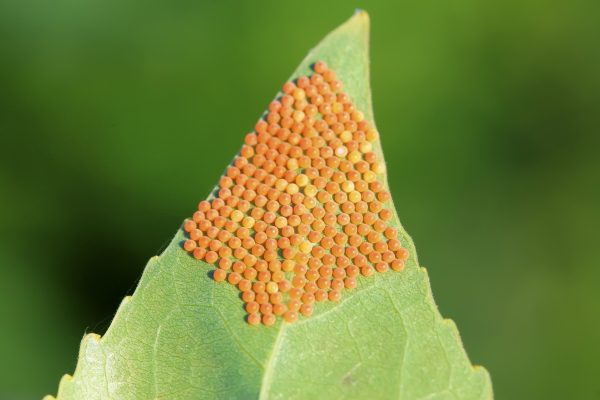Insect Egg Identification

As you walk around your property, you may spy little eggs on leaves and in your garden area. There’s a high likelihood you’re seeing insect eggs just waiting to hatch. Understanding some basic insect egg identification can help you know what types of eggs they are and when you should be concerned about their presence.
Keep reading to get a primer on insect egg identification and learn how to prevent an insect breeding ground on your property.
Related Topic: Is an All-Natural Mosquito Treatment Right for You?
Identifying Insect Eggs in the Garden: Common Culprits
There are many different types of insect eggs in the garden, ranging in color from the darker eggs of female stink bugs to white fuzzy patches of eggs from stem borers. This blog will focus on two of the most common: white and yellow insect eggs.
While some white and yellow insect eggs can produce bugs that are relatively harmless, others can lead to insects that create a dangerous situation in your garden or lawn.
White Insect Eggs on Leaves
Some of the most common insects that lay white eggs on leaves near homes and gardens include:
Whiteflies: Adult whiteflies place their tiny white eggs on the undersides of leaves in concentric patterns, from the bottom to the upper portion of a plant. These insects can produce as many as 200 to 400 eggs. Unfortunately, whiteflies can injure and kill plants by sucking the sap from the leaves, causing them to shrivel and drop prematurely. To get rid of whiteflies, vacuum them or use insecticidal soap or horticultural oil.
Cutworms: The cutworm’s white eggs show up on grass and weed stems and in the soil surrounding plants. The eggs tend to become darker right before hatching. Cutworms often take shelter in the soil during the day and feed on plants at night. These insects can be a nuisance in the garden. They get their name from their ability to “cut off” a plant seeding by chewing through the stem. To protect your plants from cutworms, control weeds and grass with regular mowing and protect seedlings with collars made from cardboard toilet paper rolls or plastic drinking cups.
Japanese Beetles: The eggs from the Japanese beetle are oval and creamy white. They start at around 1/16″ long but double in size and become rounder before hatching. Japanese beetles are known for chewing up flowers and skeletonizing leaves, making them an enemy of your garden. Applying beneficial nematodes or milky spores can help you get rid of these beetles over time. Faster options to destroy these eggs include spraying them with neem oil or pyrethrin-based insecticide.
Yellow Insect Eggs on Leaf: Common insects that lay yellow eggs on leaves near homes and gardens include:
Aphids: Bright yellow in color, aphid eggs are often found on rose bushes, milkweeds, and other plants. These eggs can make it difficult for monarch butterflies to feed on milkweeds and flourish. Aphid-affected plants show stunted growth and puckered leaves and typically die without proper treatment. Washing plants with a forceful spray of water can dislodge aphids, while organic solutions made of horticultural oil, insecticidal soap, or neem can get rid of the eggs.
Spider Mites: Spider mite eggs begin as translucent and turn a yellowish-cream color before hatching. The adults lay up to 200 eggs on the undersides of leaves. They can infest over 180 species of plants, stunting their growth and potentially killing them. Fruits, vegetables, herbs, and landscaping plants are all susceptible to spider mites. Use a plant-safe pesticide to destroy the eggs. You can also wipe the eggs off each leaf or apply a solution of essential oils, including rosemary, spearmint, or coriander, to kill and prevent spider mite egg infestation.
Get Rid of Insect Eggs in Your Garden with Help from Mosquito Joe
Finding eggs that threaten the plants around your home or in your garden can be unsettling. Fortunately, you have options. Your local Mosquito Joe can be your first line of defense against damaging insects. Our pest control services are dedicated to helping you keep your property, lawn, and garden healthy. We can treat your yard with a safe and effective mosquito barrier spray that lasts for up to 30 days. Call 1-855-275-2563 or schedule an appointment online today.



